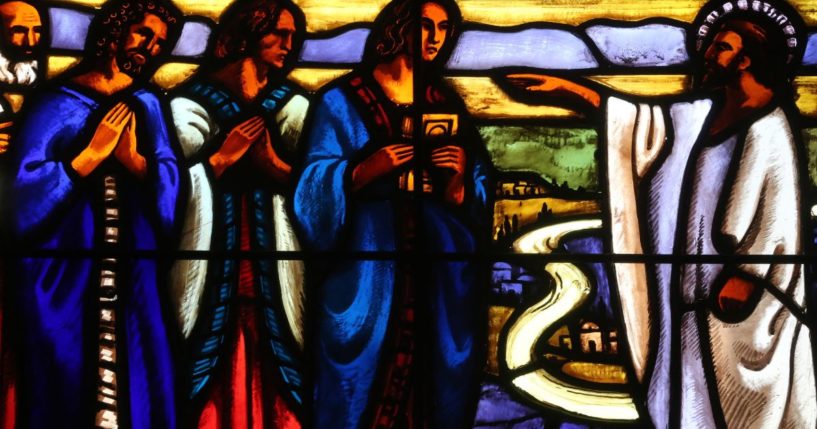
Drollinger: Becoming More Like the 12 - Are You Someone the Lord Can Use Mightily?
Many mature Christians long to be used by God, but what are the qualities God is looking for in us in order to determine to use us mightily?
Our country desperately needs Christian public servants, and citizens, for that matter, who will turn America upside down!
Are you someone he can use mightily and extraordinarily? What was Jesus looking for in the 12 disciples he chose to follow him and ultimately turn the world upside down (Acts 17:6)?
This week’s Bible study, “Becoming More Like the 12 Amongst the 535 in 2023” shows, biblically, that though they had little in common outwardly, Jesus noted something in common inwardly among those he chose to disciple and ultimately spread the gospel throughout the world.
In Mark 3:13-19, Jesus chooses the 12 disciples. These ordinary men had vastly different personalities, temperaments, affiliations and proclivities. Highlighted are six of them in paired contrasts:
Peter was bold and brash, aggressive and opinionated. He was an upfront guy who led thousands to Christ through his preaching. Andrew, on the other hand, liked being behind the scenes. Inconspicuous, thoughtful and reflective, he was all about winning individuals, versus the masses, to Christ.
Matthew was a politically traitorous tax collector, an ally of the Romans. Simon, on the other hand, was a political Zealot, a rebel who outwardly opposed the occupying Roman forces! (Imagine those two getting along on the same team!)
James was very passionate, while Philip was a pessimistic bean counter!
Aware of all these differences, Jesus nonetheless recruited each one to be a part of his team because they all possessed something in common that was essential!
Humility is the essential characteristic that God requires in people whom he greatly empowers for use in this world. These are emptied-of-self, contrite-of-heart individuals.
2 Chronicles 16:9 associates this essential character quality with heavenly usefulness: “For the eyes of the Lord move to and fro throughout the earth that He may strongly support those whose heart is completely His.”
Paul, the later arriving apostle of Jesus Christ whom God used mightily, best defines what possessing a heart that is “emptied of self and completely his” means. He stated to the church of Galatia in Galatians 2:20, “I have been crucified with Christ; and it is no longer I who live, but Christ lives in me; and the life, which I now live in the flesh I live by faith in the Son of God, who loved me and gave Himself up for me.”
What kind of people does God use the most? He uses those who continually view themselves as God’s vehicle, in want of nothing during this life’s journey. A humble person is a dead-to-self person. Only people who are empty of self will have room for Christ to become all both in and through them.
In his book “The Screwtape Letters,” C.S. Lewis describes humility not as having a low opinion of one’s talents and character, but rather as self-forgetfulness.
The word “humility” (tapeinos in the Greek), which is found 11 times in the New Testament, means “low in spirit.” In Jesus’ Beatitudes, found at the beginning of the Sermon on the Mount (Matthew 5), the same Greek word is translated “poor in spirit.” Being meek or poor in spirit stands in biblical juxtaposition to the idea of self-sufficiency. Humility is the realization of one’s utter failure and doom apart from God’s intervention of grace — not only in an eventual, eternal sense, but also in the present.
Humility is even more essential for the public servant or any mature Christian when the biblical truth found in 1 Corinthians 1:26-29 is taken into consideration:
“For consider your calling, brethren, that there were not many wise according to the flesh, not many mighty, not many noble; but God has chosen the foolish things of the world to shame the wise, and God has chosen the weak things of the world to shame the things which are strong, and the base things of the world and the despised God has chosen, the things that are not, so that He may nullify the things that are, so that no man may boast before God.”
This passage underscores the principle that God primarily uses ordinary people — those who are more apt to be humble — to build his kingdom and change the world. This keen insight explains and illustrates why Jesus chose the common folks, i.e., those more apt to possess this essential character trait.
Very importantly, however, this passage also says that some (not many, as it literally states in the passage) whom he calls and desires to use are in the world’s eyes wise, mighty and noble — so long as they too are humble (which is less likely).
Some believers point to this passage to justify the Christian’s supposed non-involvement in government, as if God’s economy for changing the world and fulfilling the Great Commission is to use only the foolish, the weak and the despised. It is important that the Christian public servant be able to point to the fact that the passage reads “not many” rather than “not any” when challenged with this way of thinking. Paul is a good example of a person who was one of not many: He was an outstanding, highly visible leader in his day (cf. Philippians 3).
Also key to understanding the importance of humility relative to usefulness by God is James 4:6. Scripture says, “God is opposed to the proud, but gives grace to the humble.” Notice the Greek meaning of the word “opposed.” The word for “opposed” (antitasso) means “to rage in battle against.” God empowers the humble and combats with the proud. Accordingly, don’t find yourself in a battle with God. Rather, be characterized by humility and dependence on the Savior.
Click here to read the full study.
The views expressed in this opinion article are those of their author and are not necessarily either shared or endorsed by the owners of this website. If you are interested in contributing an Op-Ed to The Western Journal, you can learn about our submission guidelines and process here.
Truth and Accuracy
We are committed to truth and accuracy in all of our journalism. Read our editorial standards.
Advertise with The Western Journal and reach millions of highly engaged readers, while supporting our work. Advertise Today.












